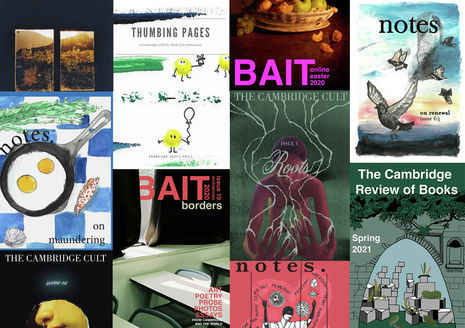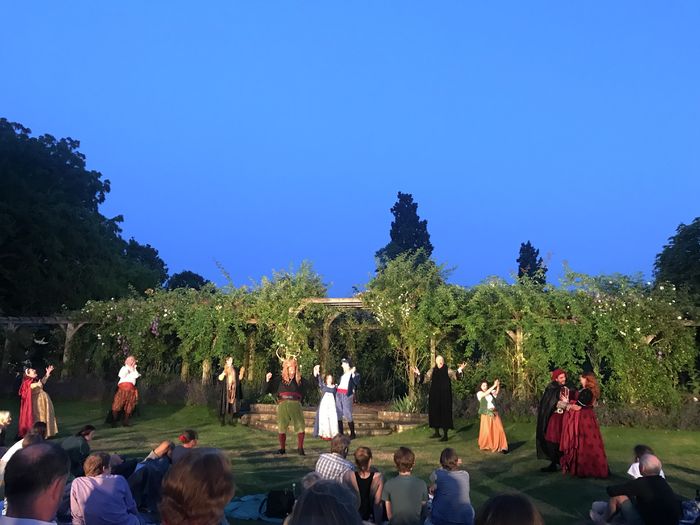The Cambridge Zine: Reclaiming Space and Place
Margherita Volpato explores the zine scene in Cambridge, reflecting on how words can both encapsulate and help us navigate the student experience

We’ve all been there. You move to a new town, or (even more impressively) a new country, and suddenly you become aware of yourself in a 3D sense. You’re no longer just a voice inside your own head, but instead an actual living-breathing human who moves inside a place. And, this acknowledgment brings you to the full-frontal realisation that you don’t know much about this place aside from what you might have seen online or in a super-packed self-guided open day (which was probably a rare occurrence for those incoming freshers — thanks Covid).
Your place in this new world, where suddenly you might find yourself defined by what hobbies you chose to take on or by what college you go to, becomes hyper-linked to Cambridge, itself, as a place. The very language we use to navigate our university experience links us inextricably to place, setting, and time. It’s very hard to escape, but also quite challenging to enter smoothly. One might feel a shift in identity, and I don’t mean imposter-syndrome (although perhaps that too) when faced with this new bubble.
“The very language we use to navigate our university experience links us inextricably to place, setting, and time.”
And yet, this is not entirely true. Cambridge might seem like an all-consuming place. The history, the expectations, the lingo, the hustle-and-bustle; but, there is a way to reclaim it, and it begins with language itself. When I first arrived at Cambridge, the only writing I did was in my journal. Everything else, especially Varsity, seemed like a daunting, out-of-my-league place because I saw all these other publications as being defined by Cambridge, the university and its brilliant students. But in reality, most of these publications would resent this, and you might not realise until you look closer. In particular, the Cambridge (maga-)zine phenomenon — an unnecessary title wholly of my own invention, but one that I hope you’ll embrace (if only to humour me).
Around the world, I would argue magazines are going out of fashion. Aside from the biggest publications (and even those have converted a large chunk of their content to digital platforms), many small magazines have died out. The physicality of a written publication in your hand is no longer needed to connect with those who write in it. Cambridge students disagree. The zine, another Cambridge-specific term, thrives. There are new publications termly, and new ones being created all the time to fill gaps in audience, or voice, or interest. They reclaim the language of Cambridge, and convert it from a place to a space, where one’s language travels, paradoxically free of place and yet held infinitely on a piece of paper. These spaces are entangled, ever-changing, always advancing because they are filled by voices of students who understand that Cambridge is more than a place, and should be defined by more than the language that we, its students, use to describe it.
Here is a space, where as a writer, you can find a voice devoid of definition, where your identity can exist in, and simultaneously reject, its place. These Cambridge zines not only redefine language, but its medium as well. Some exist in a purely digital form, the true definition of place-less, whereas others travel by print and are hard to get your hands on. They all embrace their ephemerality, aware that it is not that one edition of their zine which matters, but the continuity of the tradition of displacement. Our zines will only continue to thrive as they continue to create new spaces, filling voids with voices and thoughts.
For those students wishing to pursue writing, these zines could provide the starting point to your discovery as an author, journalist or critic. To readers, be greedy and absorb all that these students have to say. Never has a place such as Cambridge been host to so many spaces of writing. From BAIT, to Notes, to The Cambridge Cult, there’s everything you could ever wish to explore. Some use funds to support local, or international, charities. Some provide spaces for underrepresented voices, some represent student writing in foreign languages and all explore the importance of individuality and identity. And if you can’t find what you’re looking for, you must create that space. For the good of the rest of us readers, dying to explore every space imaginable.
So if you’re looking to get started in the zine scene, as well as heading to the Freshers Fair, have a look at the Cambridge Arts Facebook page. It itself is a space, a community where all the zine committees, and other arts societies (from dance or music to photography and film), join. It would be fruitless to include a comprehensive list of zines here; indeed, it would defy the whole point of this article. The zine scene itself cannot be captured entirely in writing, because it, itself, is an ever-changing space. All I can do is direct you on your journey, and hope you find a couple of destinations, throughout your time at Cambridge, where you will both read and write, and escape to find solace in spaces previously unknown.
 News / Eight Cambridge researchers awarded €17m in ERC research grants27 December 2025
News / Eight Cambridge researchers awarded €17m in ERC research grants27 December 2025 News / Downing investigates ‘mysterious’ underground burial vault 29 December 2025
News / Downing investigates ‘mysterious’ underground burial vault 29 December 2025 Lifestyle / Ask Auntie Alice29 December 2025
Lifestyle / Ask Auntie Alice29 December 2025 Sport / Hard work, heartbreak and hope: international gymnast Maddie Marshall’s journey 29 December 2025
Sport / Hard work, heartbreak and hope: international gymnast Maddie Marshall’s journey 29 December 2025 Interviews / Meet Juan Michel, Cambridge’s multilingual musician29 December 2025
Interviews / Meet Juan Michel, Cambridge’s multilingual musician29 December 2025









